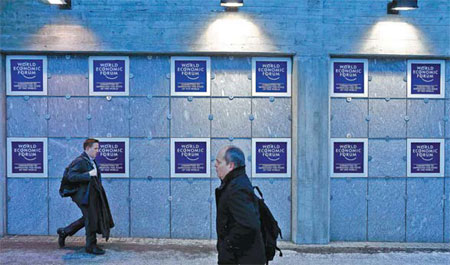Davos execs cool to low-margin markets
'Gold rush is over' as bosses take new look at developing economies
Multinational companies are becoming pickier about emerging market investments as slowing growth in upstart economies and a recovery in the West takes the shine off a previous sure-fire strategic bet.
Executives in Davos said they remained committed to tapping into rising middle classes from Shanghai to Lagos, but some are pulling back and redeploying resources in particularly difficult, low-margin regions.
"It was a gold rush. Now the gold rush is over," said Jeff Joerres, chief executive of staffing company Manpower Group, whose clients include many top international firms.
"In the past, regardless of industry and regardless of product, you just ran to those emerging markets because there was an arbitrage opportunity. Now there's a much more sanguine decision-making process."
The new mood follows a marked shift in the balance between the world's main engines of economic growth that will see developed economies, led by the United States, regaining their role as the central driver of global output in 2014.
Emerging markets will still grow at a faster pace than developed markets this year, but the difference in growth rates will be the lowest since 2002.
Midlife crisis?
The World Bank last week raised its forecast for global growth for the first time in three years, to 3.2 percent in 2014 from 2.4 percent in 2013. But it cut forecasts for developing countries to 5.3 percent for 2014, from 5.6 percent predicted in June.
The balance between emerging and developed economies is a central topic at this week's World Economic Forum annual meeting in the Swiss Alps, as highlighted by a session on Thursday titled "BRICS in Midlife Crisis?"
Growth rates for Brazil, Russia, India and China are half their pre-financial crisis levels and companies are taking a hard look at alternatives beyond the "big four".
The Middle East and Indonesia were highlighted as hotspots for online growth by Yahoo CEO Marissa Mayer, while Marriott International boss Arne Sorenson said his group was opening a new hotel in Rwanda.
However, a top executive at a US tech company, who did not want to be identified, said his firm was having an especially tough time in Brazil, with big uncertainties also in Russia, leading the company to look at deploying resources elsewhere.
In fact, 60 percent of firms now expect to shift investment away from BRICS toward other more rapidly growing markets, according to an Accenture survey of more than 1,000 executives.
"It's getting tougher and more competitive and some companies will find that they haven't got the right strategy in certain places," said Mark Spelman, Accenture's strategy head.
"There may be some that will pull out, but we will continue to see more investment at the same time."
From autos to soap to whisky, multinational companies have been increasing their exposure to emerging markets dramatically in recent years.
Europe's top 505 companies generated a third of their sales in emerging markets last year, or 2.8 times more than in 1997, according to Morgan Stanley. But the curve from here is set to flatten.
"You should expect that line to go sideways for a while, but I don't think it will fall materially," said Morgan Stanley strategist Graham Secker.
"Companies will perhaps focus a bit more on opportunities in developed markets - for example, a European chemical company might want to relocate some assets in the US to take advantage of low energy costs."
Reuters
|
World Economic Forum participants walk outside the site of the annual meeting in Davos, Switzerland, early on Thursday morning. Ruben Sprich / Reuters |
(China Daily 01/24/2014 page10)















